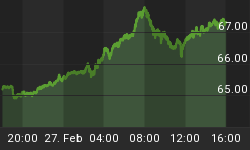Stock and bond markets have rallied following the Federal Reserve's announcement of quantitative easing (i.e., printing new money to buy government debt). However, following the failure of the UK Gilt auction on Wednesday, and the rhetoric from China regarding the US Dollar, it is clear that lenders, public and private, are pushing back on funding government deficits.
The push back on lending to governments is important because it shows that the demise of the credit bubble has now reached a climactic stage that will lead to the collapse of the Dollar. When the market stopped funding weak subprime lenders, such as Accredited Home Lenders and New Century Financial, both firms failed. When the market stopped providing funding to Countrywide and Bear Stearns, both would have failed if not for bigger firms taking them over. Unfortunately for the US Government, there is no entity left to bail it out. Clearly, when the market decides it no longer wants to finance a heavily levered borrower, the entity cannot survive.
While government programs have been created to save financial institutions, the financial system can function only if investors are willing to fund government deficits. However, the failed UK Gilt auction and the Federal Reserve's announcement of buying its own debt show that without quantitative easing there is not enough private capital at current interest rates for governments to stimulate the economy and fund bailout programs. As a result, the Federal Reserve is using the fear of deflation to gain public approval for quantitative easing. However, the actual driving force behind quantitative easing is to create artificial demand for Treasury bonds because without it the Government would lose access to funding and the financial system would collapse.
The idea that the US Government would not be able to fund its deficits without quantitative easing has huge implications for US financial institutions. It is obvious that almost every financial institution would have already filed for bankruptcy had the government not stepped in with further capital through TARP or by the FDIC guaranteeing debt issuances. With the US Government now facing pushback on its deficits, it is ironic that the financial stocks are leading the recent bear market rally.
When a private financial institution begins to have trouble funding its deficits, its problems almost always spiral out of control. It did not take long for modern-day bank runs to occur at Fannie Mae and Freddie Mac, as well as at investment banks, commercial banks and mortgage originators, when funding problems became apparent. Funding problems are precisely what the US government is now facing. Similar to a run on a company's stock, when a country cannot fund its deficits a currency crisis ensues.
The quantitative easing programs in the United States and United Kingdom are not about preventing Japanese-style deflation. On the contrary, quantitative easing today is about helping to fund new debt issuances by an insolvent borrower. However, the bond purchases are only temporarily delaying our country's day of reckoning. Every entity that has come into contact with the unwinding credit bubble has been unable to survive. Now that various governments are showing signs of instability after getting involved with the unwinding credit bubble, it is clear that their actions will also prove fatal. The real crisis lies ahead.















